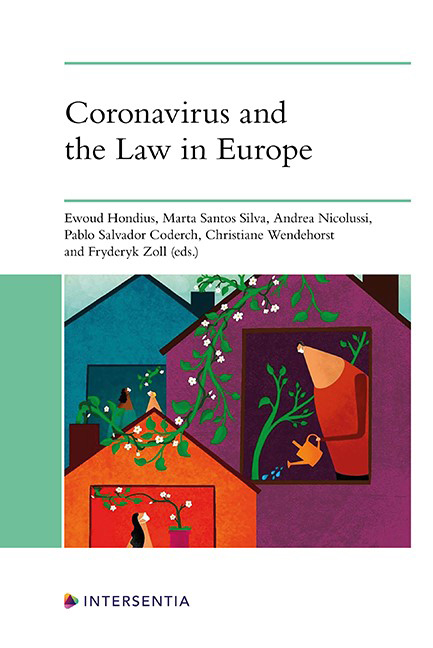Book contents
- Frontmatter
- Preface
- Contents
- List of Keywords
- List of Contributors
- PART I COVID-19 AND FUNDAMENTAL RIGHTS
- PART II STATES AGAINST THE PANDEMIC
- PART III COMPENSATION FOR COVID-19 RELATED DAMAGE
- PART IV CONTRACT LAW
- PART V CONSUMER LAW
- PART VI LABOUR AND SOCIAL LAW
- PART VII CORONAVIRUS CHANGING EUROPE
- Epilogue
- Annex: ELI Principles for the COVID-19 Crisis
- About the Editors
State Liability for Personal Injuries Caused by the COVID-19 Disease under Spanish Law
Published online by Cambridge University Press: 10 December 2021
- Frontmatter
- Preface
- Contents
- List of Keywords
- List of Contributors
- PART I COVID-19 AND FUNDAMENTAL RIGHTS
- PART II STATES AGAINST THE PANDEMIC
- PART III COMPENSATION FOR COVID-19 RELATED DAMAGE
- PART IV CONTRACT LAW
- PART V CONSUMER LAW
- PART VI LABOUR AND SOCIAL LAW
- PART VII CORONAVIRUS CHANGING EUROPE
- Epilogue
- Annex: ELI Principles for the COVID-19 Crisis
- About the Editors
Summary
The fundamental question about causation that arises in relation to COVID-19 infections is whether the appearance of the virus (together with its high transmission capacity among the population and its lethality) amounts in effect to force majeure that breaks the causal relationship between the personal damages caused by COVID-19 and the Government’s action in managing the health crisis. This contribution also addresses the issue whether, in a situation of extreme urgency, and given limited healthcare resources, a lower standard of care is expected of public health professionals than the one that would prevail under normal conditions. In addition, public administrations are likely to face claims based on tort law on the grounds that some patients were not properly attended to by medical services due to the limited health resources available, as well as the fact that some health professionals were bound to provide essential services, without being provided with the mandatory protective equipment to carry out such activity safely in accordance with the legislation.
INTRODUCTION
In Spain, as of 2 July 2020, the total number of deaths from the COVID-19 disease amounted to 28,368, of which 19,588 were fatalities in old people’s homes and residence centres (the Spanish Government has to date not made these figures public), and 52 were health professionals. Based on a comparison of coronavirus deaths in 183 countries relative to their population, Spain is the country with the third highest rate of coronavirus deaths per one million population as of 1 July 2020 (606.86 deaths per million), after Belgium (853.35) and United Kingdom (657.7). Big differences show up between countries: France (444.52), Netherlands (354.77) or Germany (108.44). As professor Carlo Caduffpoints out, the “staggering differences between countries cannot solely be explained by demography or rates of infection …. What the differences might reveal … is that some healthcare systems are able to deal with the crisis in a better way than others”.
The Spanish State has adopted drastic measures aimed at containing the spread of the COVID-19 disease caused by the new SARS-CoV-2 coronavirus, compared to other countries, for example the Netherlands or Sweden.
- Type
- Chapter
- Information
- Coronavirus and the Law in Europe , pp. 365 - 380Publisher: IntersentiaPrint publication year: 2021



